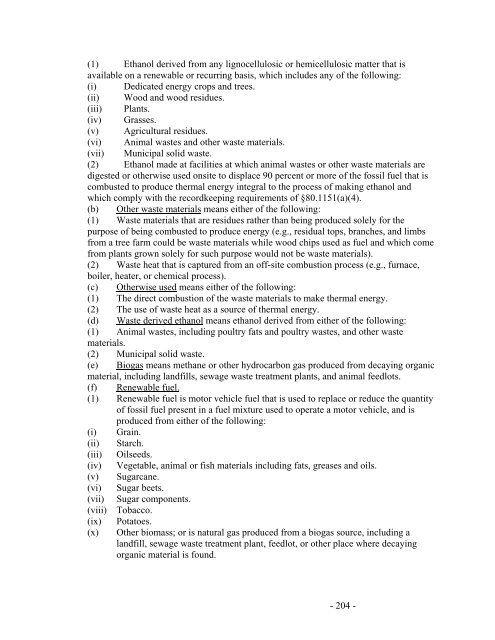Regulation of Fuels and Fuel Additives: Renewable Fuel Standard ...
Regulation of Fuels and Fuel Additives: Renewable Fuel Standard ...
Regulation of Fuels and Fuel Additives: Renewable Fuel Standard ...
You also want an ePaper? Increase the reach of your titles
YUMPU automatically turns print PDFs into web optimized ePapers that Google loves.
(1) Ethanol derived from any lignocellulosic or hemicellulosic matter that is<br />
available on a renewable or recurring basis, which includes any <strong>of</strong> the following:<br />
(i) Dedicated energy crops <strong>and</strong> trees.<br />
(ii) Wood <strong>and</strong> wood residues.<br />
(iii) Plants.<br />
(iv) Grasses.<br />
(v) Agricultural residues.<br />
(vi) Animal wastes <strong>and</strong> other waste materials.<br />
(vii) Municipal solid waste.<br />
(2) Ethanol made at facilities at which animal wastes or other waste materials are<br />
digested or otherwise used onsite to displace 90 percent or more <strong>of</strong> the fossil fuel that is<br />
combusted to produce thermal energy integral to the process <strong>of</strong> making ethanol <strong>and</strong><br />
which comply with the recordkeeping requirements <strong>of</strong> §80.1151(a)(4).<br />
(b) Other waste materials means either <strong>of</strong> the following:<br />
(1) Waste materials that are residues rather than being produced solely for the<br />
purpose <strong>of</strong> being combusted to produce energy (e.g., residual tops, branches, <strong>and</strong> limbs<br />
from a tree farm could be waste materials while wood chips used as fuel <strong>and</strong> which come<br />
from plants grown solely for such purpose would not be waste materials).<br />
(2) Waste heat that is captured from an <strong>of</strong>f-site combustion process (e.g., furnace,<br />
boiler, heater, or chemical process).<br />
(c) Otherwise used means either <strong>of</strong> the following:<br />
(1) The direct combustion <strong>of</strong> the waste materials to make thermal energy.<br />
(2) The use <strong>of</strong> waste heat as a source <strong>of</strong> thermal energy.<br />
(d) Waste derived ethanol means ethanol derived from either <strong>of</strong> the following:<br />
(1) Animal wastes, including poultry fats <strong>and</strong> poultry wastes, <strong>and</strong> other waste<br />
materials.<br />
(2) Municipal solid waste.<br />
(e) Biogas means methane or other hydrocarbon gas produced from decaying organic<br />
material, including l<strong>and</strong>fills, sewage waste treatment plants, <strong>and</strong> animal feedlots.<br />
(f) <strong>Renewable</strong> fuel.<br />
(1) <strong>Renewable</strong> fuel is motor vehicle fuel that is used to replace or reduce the quantity<br />
<strong>of</strong> fossil fuel present in a fuel mixture used to operate a motor vehicle, <strong>and</strong> is<br />
produced from either <strong>of</strong> the following:<br />
(i) Grain.<br />
(ii) Starch.<br />
(iii) Oilseeds.<br />
(iv) Vegetable, animal or fish materials including fats, greases <strong>and</strong> oils.<br />
(v) Sugarcane.<br />
(vi) Sugar beets.<br />
(vii) Sugar components.<br />
(viii) Tobacco.<br />
(ix) Potatoes.<br />
(x) Other biomass; or is natural gas produced from a biogas source, including a<br />
l<strong>and</strong>fill, sewage waste treatment plant, feedlot, or other place where decaying<br />
organic material is found.<br />
- 204 -
















